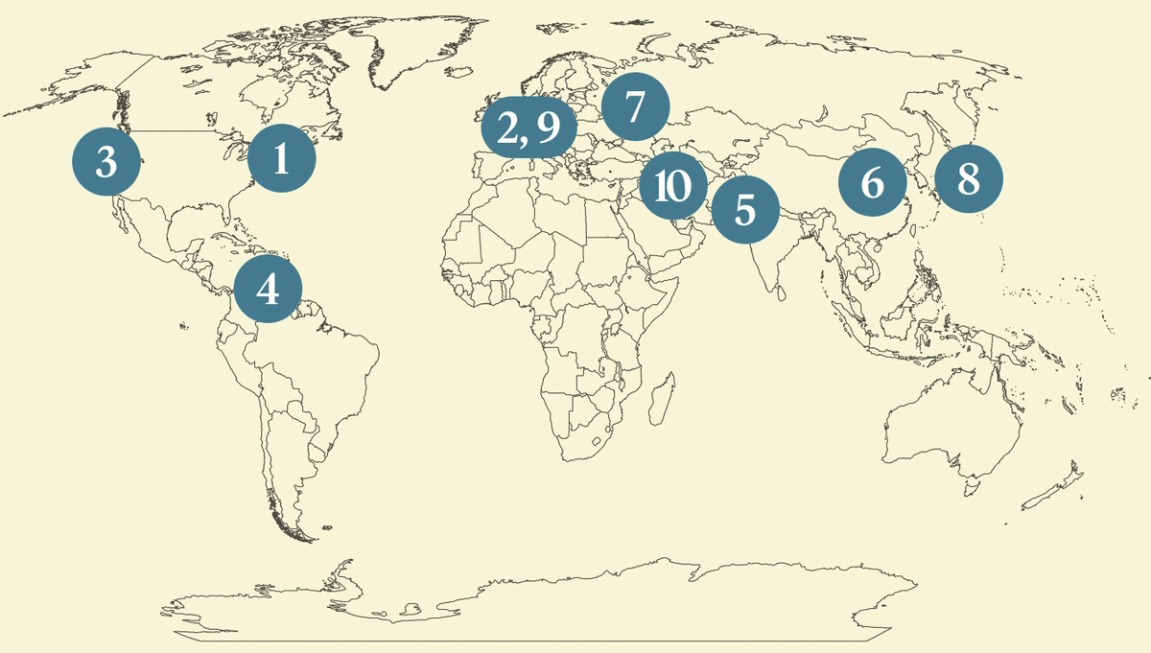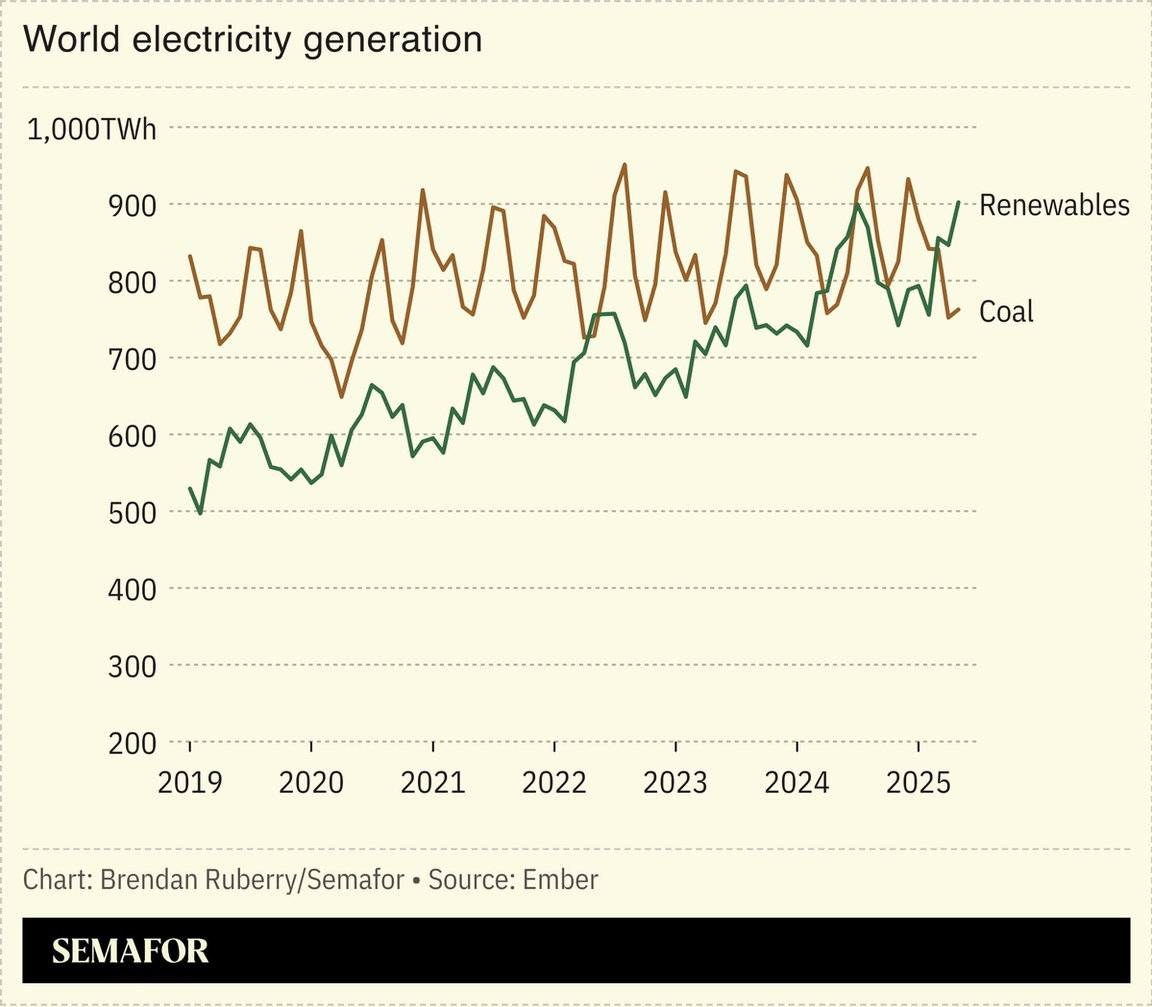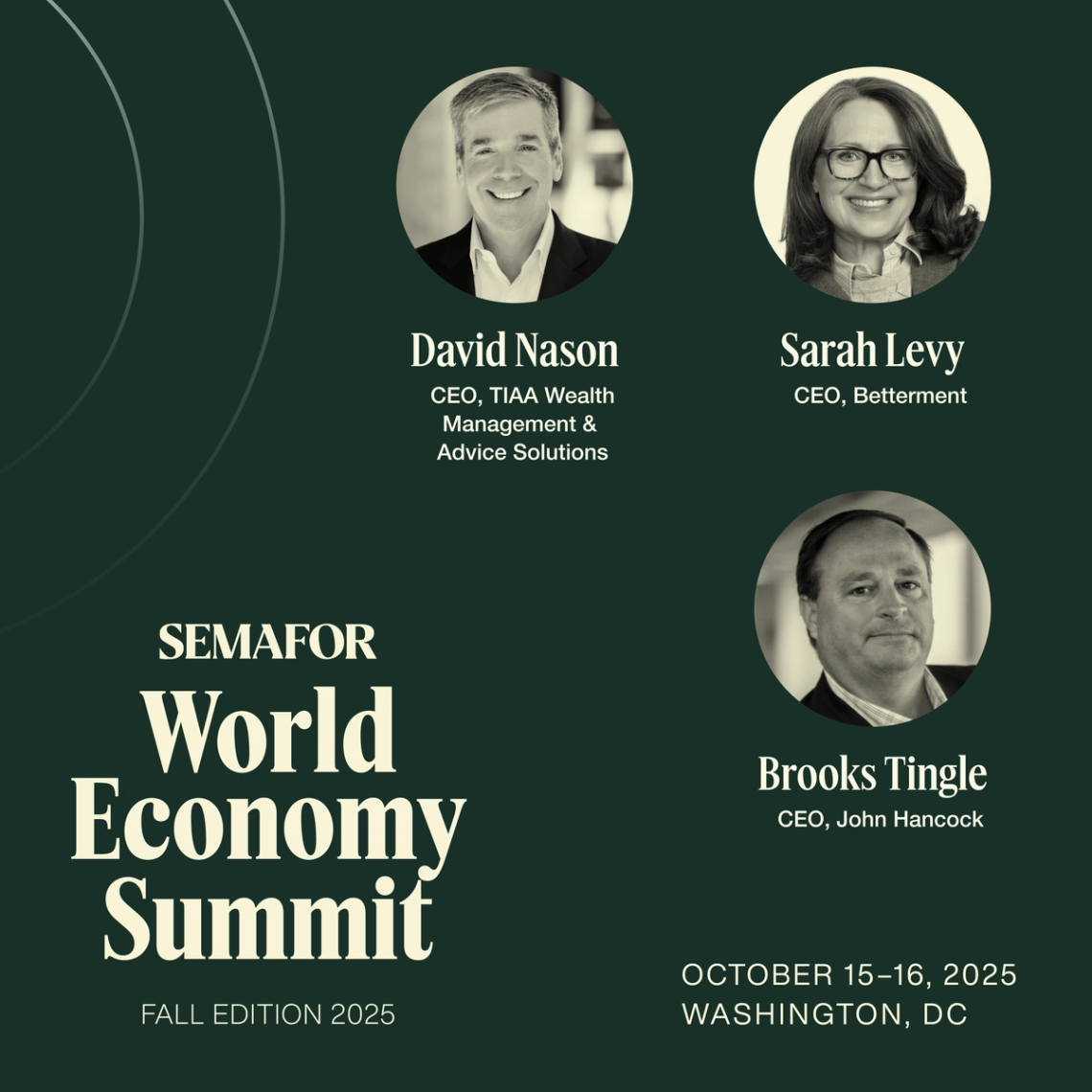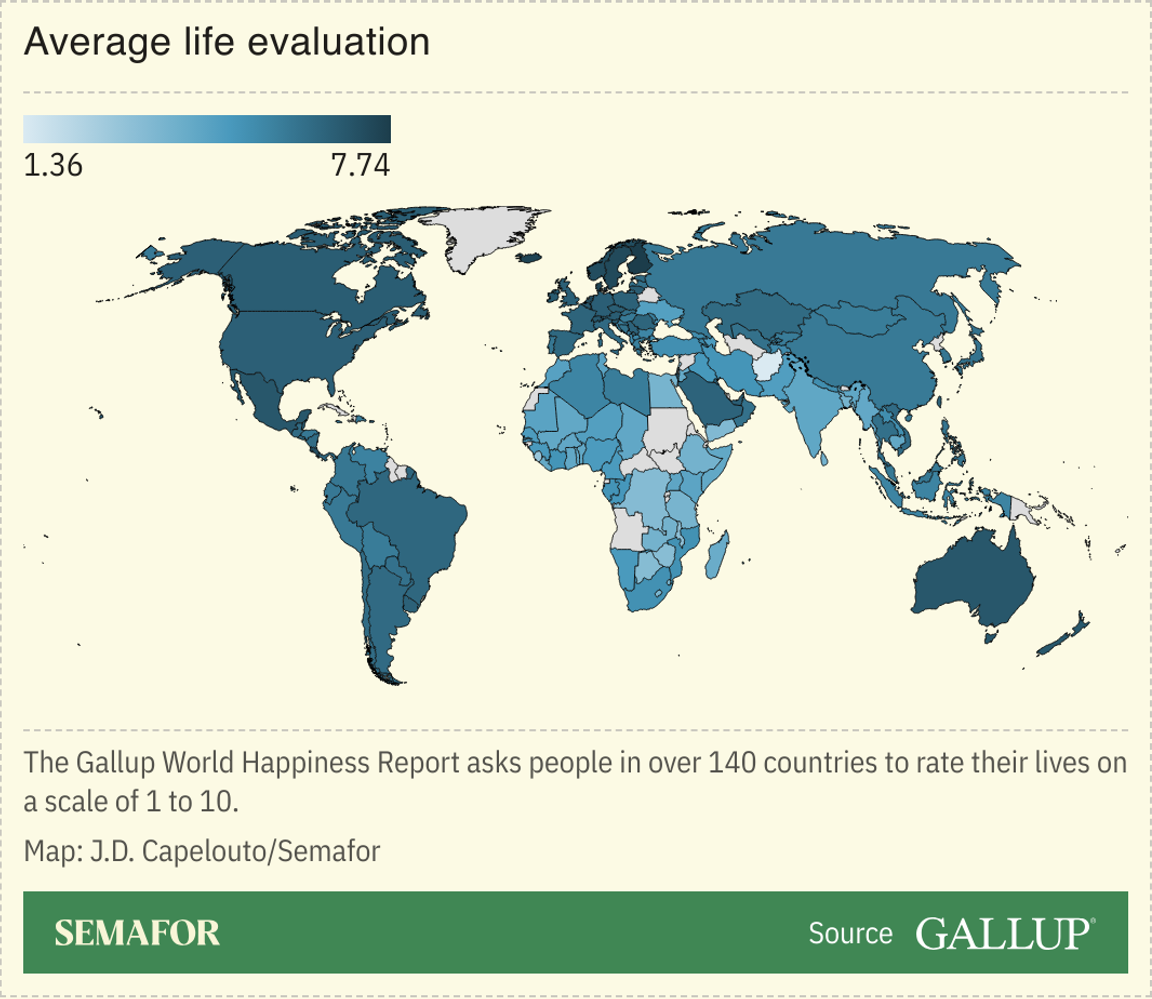| | The price of gold tops $4,000 for the first time, AI props up global trade, and Russia cracks down o͏ ͏ ͏ ͏ ͏ ͏ |
| |  | Flagship |  |
| |
|
The World Today |  - Gold tops $4,000
- Global trade swells
- CEOs call Trump
- US-Venezuela tensions
- Renewables soar
- ChatGPT cyber campaigns
- Russian war bloggers
- Nobel Prize for AI?
- Happiness through life
- Iran mulls new capital
 Two British murals are put on display 300 years after their creation. |
|
 The price of gold topped $4,000 per ounce for the first time on Tuesday, a reflection of the unease plaguing both investors and central banks. Gold is widely seen as a safe haven asset during turbulent times, and analysts attribute the latest surge to a desire among financiers to move away from US assets, even as stocks have hit new highs: The country’s government shutdown, delaying the release of official government economic data, has particularly heightened anxiety. Billionaire investor Ray Dalio compared the current environment to the inflation-heavy early 1970s, calling gold an “excellent diversifier,” although Bank of America warned of “uptrend exhaustion.” Jewelry companies have begun raising the alarm over possible price increases afflicting already-weary consumers. |
|
WTO hikes global trade forecast |
 Dave Kotinsky/Getty Images for Semafor Dave Kotinsky/Getty Images for SemaforThis year has been defined by global trade turbulence, yet more goods are set to move across borders in 2025 than in 2024, according to new World Trade Organization estimates. After US President Donald Trump unveiled sky-high tariffs in April, the WTO forecast that global trade would contract by 0.2%; but many duties have since come down, while purchases of AI-related equipment — semiconductors, computers, cloud servers — have propped up cross-border commerce. The world’s trading system “has been knocked, it’s been battered, but it is showing very strong resilience at the core,” WTO chief Ngozi Okonjo-Iweala said at a recent Semafor event. Still, the organization slashed its 2026 outlook, forecasting the world’s economy will cool. |
|
CEOs influence Trump by calling him |
 Ann Wang/Reuters Ann Wang/ReutersAmerican CEOs have found success in swaying US President Donald Trump by… calling him. Rather than schmoozing MAGA staffers or making strategic appearances on Fox News in the hope of relaying a message, the leaders of Microsoft, Nvidia, and Dell contacted the president or top aides in August to vouch for Intel CEO Lip-Bu Tan, who had faced attacks from Trump. The president backed off, and the White House later took a 10% stake in Intel. Corporate America has been puzzled over how to get Trump’s ear in the second term, but the Intel episode suggests a more CEO-friendly form of back-channel influence is returning, Semafor’s Liz Hoffman wrote: “CEOs stuck in a defensive crouch just got a reminder that offense works.” |
|
Trump calls off Venezuela diplomacy |
 Leonardo Fernandez Viloria/Reuters Leonardo Fernandez Viloria/ReutersUS President Donald Trump has ended diplomatic engagement with Venezuela, instead leaning toward a more hardline approach that could see further military escalation. Semafor previously reported that Trump’s special missions envoy took a more conciliatory tack that had irked many of the president’s allies. Since Trump resumed office, the US has attacked four boats allegedly carrying drugs off the coast of Venezuela, and is weighing strikes inside the country. Caracas is “irresistibly tempting to Trump as an enemy,” despite not being the US’ top narcotics supplier, the Financial Times’ US editor argued. Venezuela is “Trump’s Schrödinger’s war; it is neither happening nor not happening. But open conflict is a hair’s breadth away,” he wrote. |
|
Renewables pass coal as top energy source |
 Renewable energy surpassed coal as the world’s primary energy source in the first half of 2025, according to a new report. UK-based think tank Ember said the moment marked a “crucial turning point,” as solar and wind power kept up with soaring electricity demand as a result of the AI boom. But the top-line finding masks regional nuances, Ember said. Clean energy growth in the US is slowing, and the pace of adoption in China — the global leader — could temper. In many developing countries, though, renewables are booming: Pakistan imported enough solar panels in 2024 to generate around a third of its current power capacity, the BBC reported. |
|
US adversaries weaponize ChatGPT |
America’s adversaries are using ChatGPT to power hacking, surveillance, and influence schemes, according to a new report from OpenAI. While the US and China are locked in a high-stakes battle over advanced AI technology, OpenAI’s report suggests that actors linked to Beijing are using existing tools for relatively mundane tasks like parsing data or improving their language skills, CNN wrote. OpenAI said it banned a user who asked ChatGPT for help on a tool that could analyze travel and records related to China’s Uyghur minority. The findings echo some early fears around the ramifications of generative AI for cybersecurity, providing “a rare snapshot into the broader world of authoritarian abuses of AI,” OpenAI said. |
|
Russia cracks down on pro-war blogs |
 Alexander Ermochenko/Reuters Alexander Ermochenko/ReutersThe Kremlin is growing increasingly intolerant of pro-war military bloggers covering the front lines of the country’s war against Ukraine. Russian officials were initially supportive of these “war correspondents” because of their nationalist, anti-Ukraine slant. But the bloggers’ posts can also be occasionally unflattering to the Kremlin — for example, writing about problems or corruption in the military — and Moscow is moving to assert more control over them. One blogger was labeled a “foreign agent” for allegedly promoting a “negative image” of Russian soldiers, according to a Jamestown Foundation report: “The Kremlin clearly sees the movement’s relative independence as a threat that could grow after Russian President Vladimir Putin’s war against Ukraine ends.” |
|
 David Nason, CEO, TIAA Wealth Management & Advice Solutions; Sarah Levy, CEO, Betterment, and Brooks Tingle, CEO, John Hancock, will join the Fall Edition of Semafor’s World Economy Summit on Oct. 15 as we discuss how demographic shifts are reshaping retirement savings worldwide, and how business leaders, investors, and policymakers can seize this moment to innovate for a more financially secure future. Each session brings together the leaders and forces most directly shaping the global economy, with programming powered by Semafor’s world-class editorial and executive leadership.
|
|
 Peter Nicholls/Reuters Peter Nicholls/ReutersAI-powered science is advancing so quickly that it may soon make a discovery worthy of a Nobel Prize without human intervention, scientists predicted. The Nobel Turing Challenge was established in 2016 to offer a prize for a machine that can achieve a discovery equivalent to the most cutting-edge human research. For a discovery to count, the AI has to oversee the entire project, from hypothesis generation to experiment design to data analysis. Machines are already assisting human researchers in almost every step of that process, but being truly autonomous is still a leap forward. “It’s almost certain” that AI will reach that level eventually, one researcher told Nature: “The question is if it will take 50 years or 10.” |
|
 New research challenged the widely held belief that people tend to be least happy in middle age. The idea that our sense of wellbeing follows a “U-shaped curve” through life was popularized by a 2008 study, which found that people’s self-reported happiness was highest in early and later life, with a dip in the middle years. But a new study raises a depressing possibility: That happiness declines throughout adulthood, stabilizes in one’s late 50s for a few years, and then rapidly declines again. Earlier studies might have missed the effect because they may have discounted deaths from suicide or disease, one researcher told New Scientist. “After a certain age, happiness would increase only because the unhappy people are already dead.” |
|
Iran mulls moving capital |
|
|